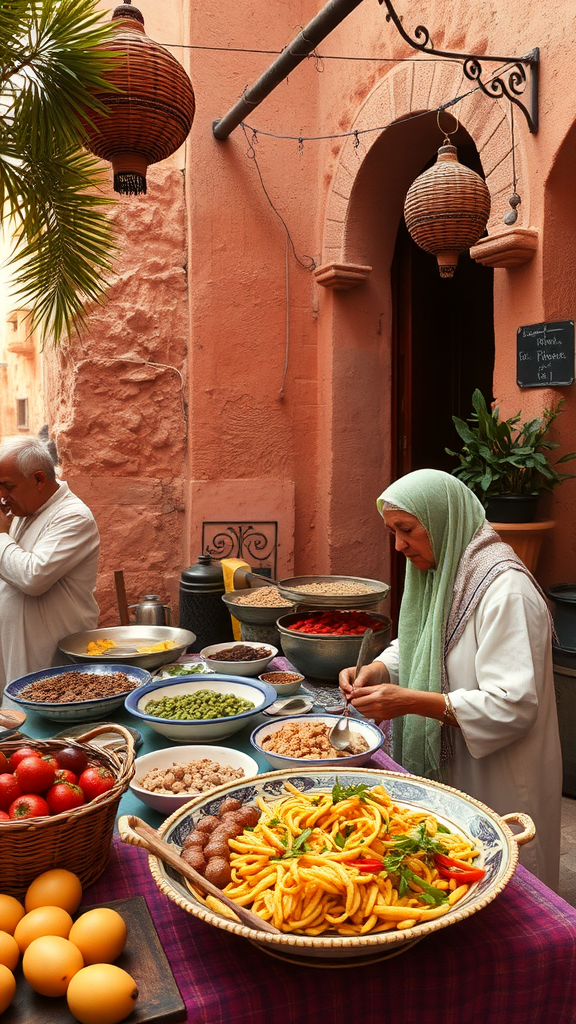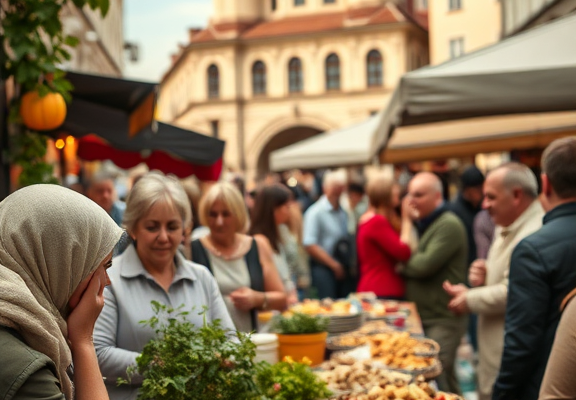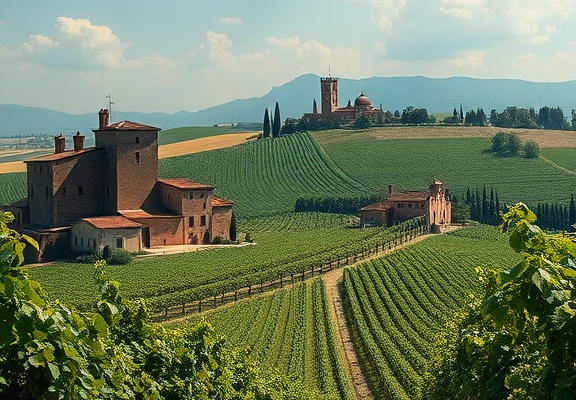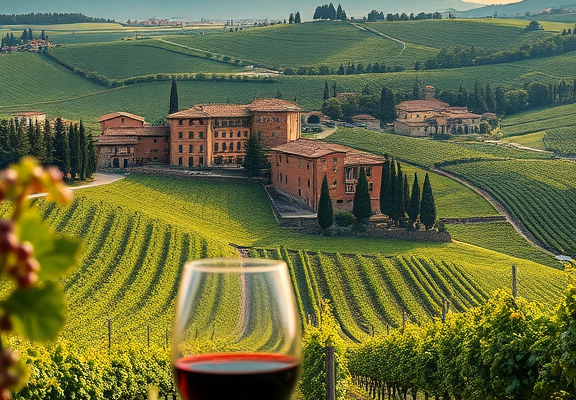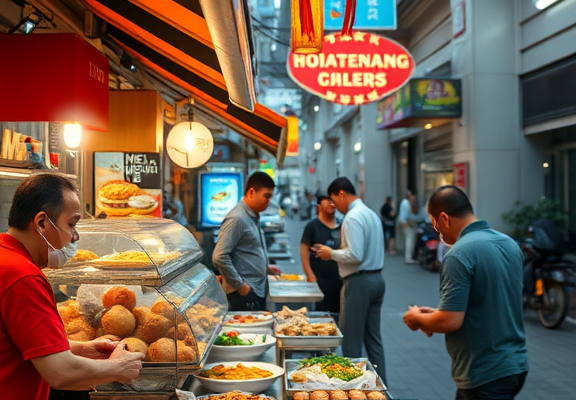Exploring the Richness of Cultural Food Experiences in Morocco
Morocco, a land where colors, scents, and sounds blend in a rich tapestry of tradition and history, offers a culinary journey like no other. When you think of cultural food experiences in this North African gem, imagine a feast for your senses. Each dish tells a story, rooted in the diverse cultures that have influenced this beautiful country.
Thank you for reading this post, don't forget to subscribe!One of the most iconic dishes you will encounter is tagine. This traditional North African stew, cooked in a special pot, comes in many varieties, from lamb tagine with apricots to vegetarian tagine brimming with seasonal vegetables. The slow cooking process allows the flavors to meld beautifully, and the unique conical lid of the tagine also helps to keep the moisture in, creating tender and juicy meat. When you savor a steaming bowl of tagine, you’re not just eating; you’re experiencing centuries of culinary expertise.
Another delightful aspect of Moroccan cuisine is the use of spices. While exploring food experiences, make sure you try ras el hanout, a spice blend that captures the essence of Moroccan flavors. With ingredients like cardamom, cumin, and cinnamon, each chef has their own twist. This blend is used in numerous dishes, adding depth and complexity that will tantalize your taste buds.
Couscous, often considered the national dish, also plays a central role in Moroccan culture. Traditionally served on Fridays, this fluffy dish made from semolina wheat is perfect for soaking up savory sauces. Accompanied by vegetables, meat, or even sweet raisins, couscous is a dish that brings people together, often shared among family and friends. Enjoying a plate of couscous at a local home will give you a glimpse of Moroccan hospitality.
Street food is another vital part of the culinary landscape. As you wander through bustling markets like Jemaa el-Fnaa in Marrakech, the aroma of grilled meats, freshly squeezed juices, and spicy pastries fills the air. Be sure to try brochettes, skewered grilled meats seasoned with spices, or b’sara, a delicious fava bean soup that is comforting and nourishing. Street food offers you the chance to engage with locals, making the experience even more memorable.
Sweet treats are equally important in Moroccan food experiences. Treat yourself to a piece of baklava, filled with nuts and drenched in honey, showcasing the legacy of Arab and Mediterranean cultures. Alternatively, enjoy traditional Moroccan mint tea, often referred to as “Moroccan whiskey.” This sweet, fragrant tea is more than just a drink; it’s a symbol of hospitality and is often served during gatherings or after meals. Sipping tea with locals not only delights your palate but also fosters connections that deepen your understanding of Moroccan culture.
- Explore Local Markets: Visit souks (markets) to see spices, fresh produce, and street food.
- Culinary Classes: Participate in a cooking class to learn how to make traditional dishes yourself.
- Rooftop Dining: Enjoy meals overlooking the bustling streets, soaking in the vibrant atmosphere.
- Food Tours: Join a guided food tour to discover hidden gems and local specialties.
Dining in Morocco is often an experience that melds food with tradition. Meals are generally eaten communally, with diners sharing from the same plate. This custom enhances the sense of togetherness and connection. If you get the opportunity to enjoy a meal with a local family, accept it. You’ll not only enjoy heartfelt hospitality but will also gain insights into everyday life in Morocco.
Additionally, many Moroccans are proud of their culinary heritage. They cherish the recipes passed down through generations, so engaging in conversations about food can open doors to cherished family stories and traditions. Food becomes a vessel for storytelling, enriching your experience and understanding of Moroccan culture.
Cultural food experiences in Morocco are filled with richness and diversity. From vibrant street food to intricate tagines and welcoming communities, every bite tells a story. It encourages exploration and connection, making your culinary journey not just about filling your stomach but also nourishing your soul. Whether you are a seasoned traveler or a curious first-time visitor, let the flavors of Morocco guide you through its vibrant cultural landscape.
The Influence of Moroccan Spices on Local Cuisine and Global Palates
The vibrant and colorful spices of Morocco are more than just flavor enhancers; they are an essential ingredient that shapes the country’s rich culinary identity. Moroccan cuisine is known for its aromatic dishes that tantalize the taste buds and invite a sense of adventure. These spices play a key role not just locally but also have started to influence food cultures globally.
When you think of Moroccan flavors, several key spices come to mind. Each one carries a story and a unique role in cooking. Some of the most notable spices that define Moroccan cuisine include:
- Cumin: This earthy spice is essential in tagines and stews. It adds warmth and a nutty flavor that complements other ingredients.
- Coriander: With its citrus undertones, coriander is used in various forms, from seeds to fresh leaves, enhancing both savory and sweet dishes.
- Turmeric: Known for its vibrant yellow color, turmeric adds depth to dishes and is also valued for its potential health benefits.
- Cinnamon: Often associated with sweet dishes, this spice finds its way into savory meals like tagine, bringing warmth and a hint of sweetness.
- Harissa: A spicy chili paste made from various peppers and spices, harissa provides a flavorful kick, often found in soups and marinades.
- Ras el Hanout: This complex blend combines numerous spices, often more than 20, tailored to the chef’s preference. It reflects the diversity of Moroccan cuisine and is a must-try.
Each spice contributes to Morocco’s rich tapestry of flavors, creating dishes that are both delightful and memorable. One of the most iconic Moroccan dishes is tagine, a slow-cooked stew named after the earthenware pot it’s cooked in. The use of spices such as cumin, coriander, and cinnamon gives tagines their signature taste. Dishes like lamb tagine with apricots or chicken tagine with olives exemplify how these spices harmonize beautifully.
Beyond local kitchens, Moroccan spices have captivated global palates, finding their way into restaurants and home kitchens worldwide. The growing interest in global cuisine has made Moroccan spices popular in various culinary circles, especially among chefs who seek to offer something unique and exotic. The rise of Moroccan-themed restaurants and food trucks highlights how these spices have made an impact beyond borders.
Notably, many home cooks are exploring Moroccan-inspired recipes as they embrace the culinary adventure of using these spices. With the availability of Moroccan spice blends in supermarkets, it’s easier than ever for anyone to experiment in their kitchens. You might find yourself trying to create a Moroccan feast at home, featuring dishes such as:
- Moroccan spiced chicken served with couscous and roasted vegetables.
- Vegetarian tagine filled with chickpeas, carrots, and dried fruits.
- Spiced lamb meatballs served in a harissa sauce.
- Moroccan mint tea, infused with fresh mint and sweetened to perfection.
The versatility of Moroccan spices allows for endless possibilities in cooking. They can transform simple ingredients into something spectacular. Many cooks appreciate the balance that these spices bring, marrying sweet and savory flavors in a harmonious way. The aromatic quality of Morocco’s spices also makes cooking a sensory experience. The scent of spices sizzling in the pan can evoke dreams of distant lands, transporting you to the bustling souks of Marrakech.
Moreover, the emphasis on fresh ingredients in Moroccan cooking perfectly showcases how spices work hand-in-hand with produce. When paired with seasonal fruits and vegetables, these spices elevate dishes to new heights, celebrating the bounty of the land. This emphasis on freshness resonates worldwide, where more people are turning to locally sourced ingredients to create globally inspired dishes.
As food lovers become more aware of the influence of Moroccan spices, the culinary scene continues to evolve. You might notice dishes in local restaurants reflecting this blend, drawing inspiration from traditional Moroccan recipes while adding a modern twist. The enchanting world of Moroccan spices invites everyone to explore, experiment, and relish the rich flavors that connect cultures across continents.
Conclusion
Immersing yourself in the cultural food experiences of Morocco is more than just tasting delightful dishes; it’s an invitation to understand the heart and soul of this vibrant nation. Each meal is a story, woven with the rich traditions and warmth of Moroccan hospitality. Whether you’re savoring a fragrant tagine or enjoying the diverse street food, every bite is infused with the country’s history and communal spirit.
The role of spices in Moroccan cuisine cannot be overstated. Ingredients like cumin, coriander, and saffron not only elevate the taste but also reveal the influence of numerous cultures that have intermingled over the centuries. These spices have captivated global palates, allowing Moroccan flavors to transcend borders and establish a presence in kitchens worldwide. Their compelling aromas and robust flavors make Moroccan food a sensory experience that many seek to replicate at home.
Embarking on a culinary journey through Morocco means discovering the unique interplay between land and table. The landscapes, from the bustling markets of Marrakech to the serene deserts of the Sahara, each contribute to the sensations and narratives behind the food. Engaging with local chefs and street vendors can deepen your appreciation of how ingredients come together to tell Morocco’s story.
Ultimately, cultural food experiences in Morocco illuminate not just the diversity and vibrancy of the cuisine but also foster connections among people. Whether you’re a seasoned traveler or planning your first visit, embracing these gastronomic adventures will leave you with lasting memories and a desire to share the joy of Moroccan cooking back home.

